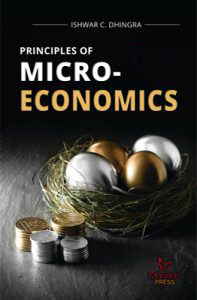Ishwar C. Dhingra | Category: Economics
Binding Type: Paperback Binding
Book DetailsISBN: 9789386677709
YOP: 2018
Pages: 714Order also on
Principles of Micro Economics is customized to the requirements of the CBCS Syllabus prescribed by the UGC for undergraduate courses in Economics at all Indian universities. As per the guidelines issued by the UGC each of the universities have reframed and prescribed new syllabus for economics. We have made a positive response to this unique change in the form of this book, Principles of Micro Economics, which forms the core of new syllabus along with two other core subjects, viz. Principles of Macro Economics and the Indian Economy (our forthcoming titles). The philosophy underlying the scheme is that there should not be a critical variation in teaching of economics at different universities.
1. Basic Concepts and Techniques
2. Theory of Demand
3. Theory of Consumer Behaviour
4. Supply Analysis and Equilibrium
5. Production Function and Analysis
6. Cost and Revenue
7. Market Structures and Equilibrium of a Firm
8. Price-Output Determination under Perfect Competition
9. Price-Output Determination Under Monopoly
10. Price-Output Determination Under Monopolistic Competition and Oligopoly
11. Factor Pricing
12. Market Failures, Government Intervention and Economics of Information
13. Welfare Economics
14. International Economics
15. Decision-Making Under Risk and Uncertainty
Appendix A
Appendix B
Principles of Micro Economics is customized to the requirements of the CBCS Syllabus prescribed by the UGC for undergraduate courses in Economics at all Indian universities. As per the guidelines issued by the UGC each of the universities have reframed and prescribed new syllabus for economics. We have made a positive response to this unique change in the form of this book, Principles of Micro Economics, which forms the core of new syllabus along with two other core subjects, viz. Principles of Macro Economics and the Indian Economy (our forthcoming titles). The philosophy underlying the scheme is that there should not be a critical variation in teaching of economics at different universities.
1. Basic Concepts and Techniques
2. Theory of Demand
3. Theory of Consumer Behaviour
4. Supply Analysis and Equilibrium
5. Production Function and Analysis
6. Cost and Revenue
7. Market Structures and Equilibrium of a Firm
8. Price-Output Determination under Perfect Competition
9. Price-Output Determination Under Monopoly
10. Price-Output Determination Under Monopolistic Competition and Oligopoly
11. Factor Pricing
12. Market Failures, Government Intervention and Economics of Information
13. Welfare Economics
14. International Economics
15. Decision-Making Under Risk and Uncertainty
Appendix A
Appendix B
| Weight | 1 kg |
|---|---|
| Dimensions | 23.5 × 15.7 × 3.5 cm |
| yop |
2018 |
| subject-category |
Economics |
| isbn |
9789386677709 |











